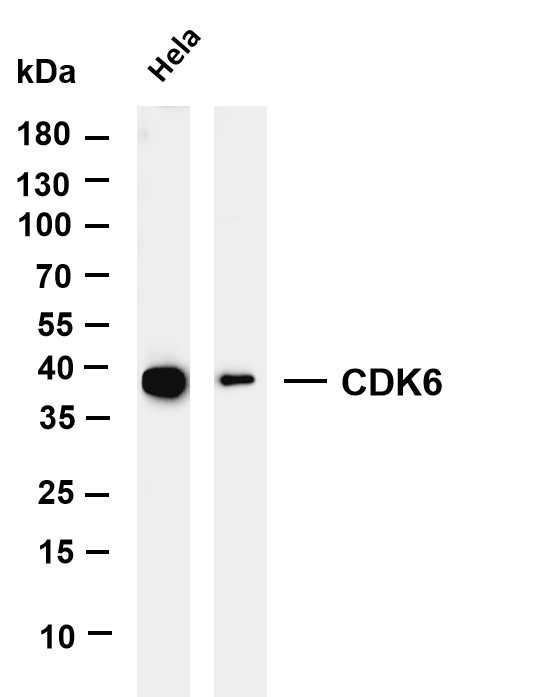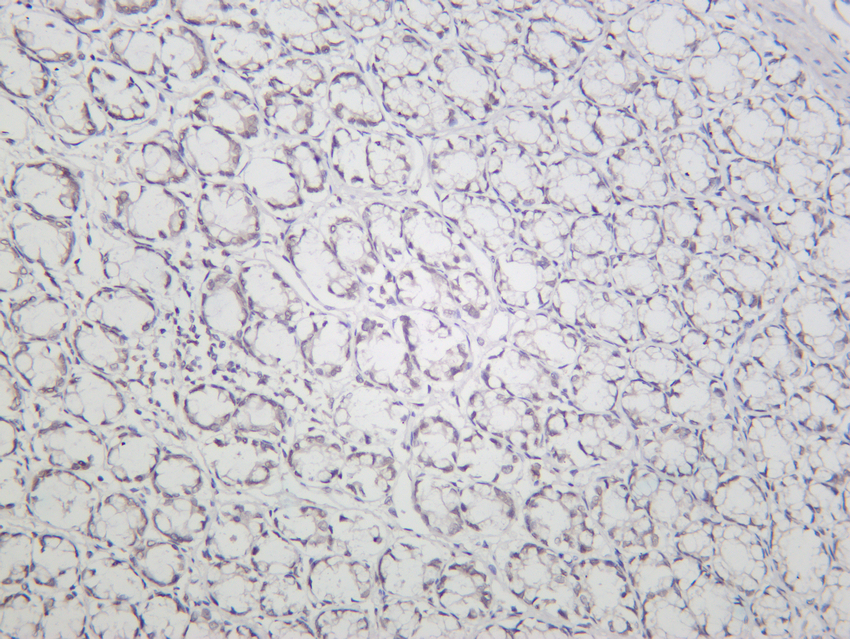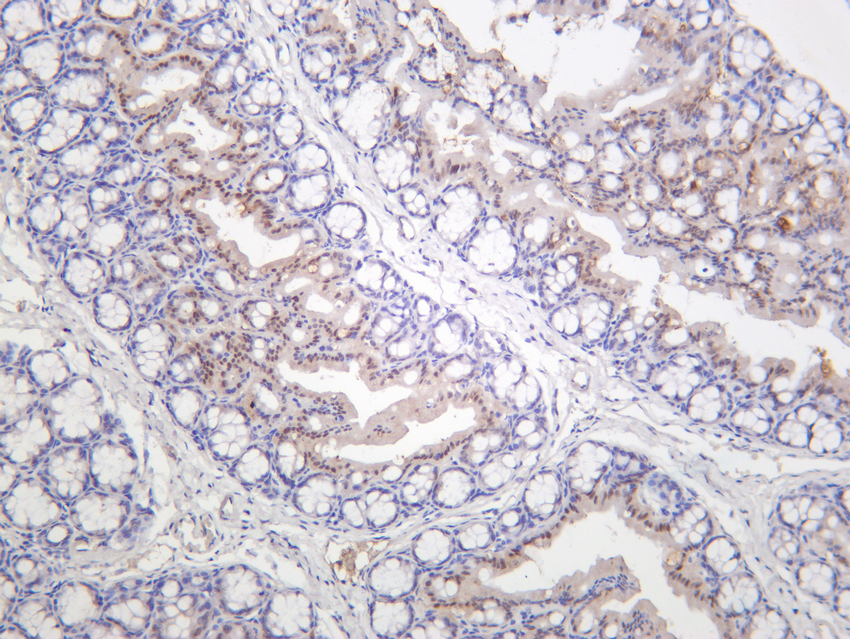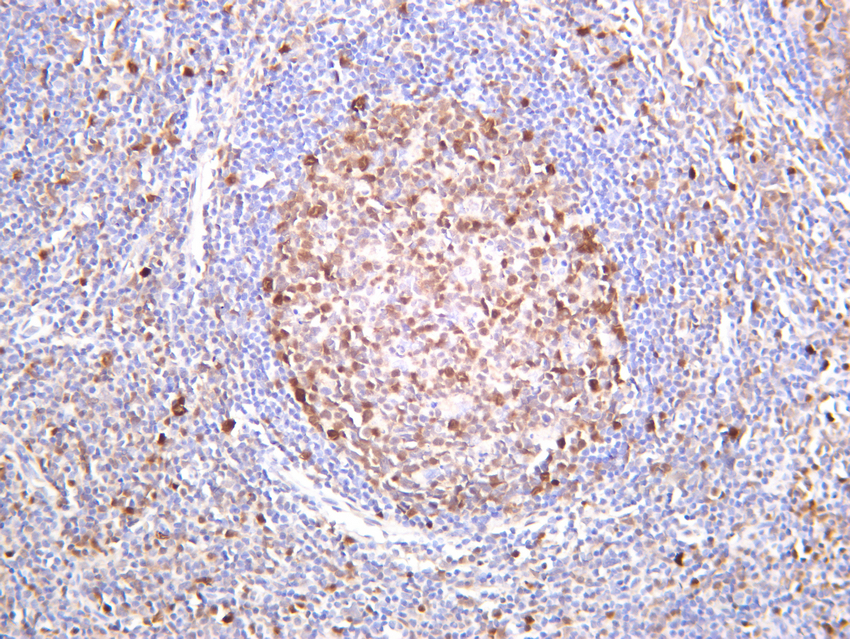CDK6 rabbit (PT0069R) mAb
- Catalog No.:YM8037
- Applications:WB;IHC;IF;IP;ELISA
- Reactivity:Human;
- Target:
- Cdk6
- Fields:
- >>Cell cycle;>>p53 signaling pathway;>>PI3K-Akt signaling pathway;>>Cellular senescence;>>Cushing syndrome;>>Hepatitis C;>>Measles;>>Human cytomegalovirus infection;>>Influenza A;>>Human papillomavirus infection;>>Kaposi sarcoma-associated herpesvirus infection;>>Epstein-Barr virus infection;>>Pathways in cancer;>>Viral carcinogenesis;>>MicroRNAs in cancer;>>Pancreatic cancer;>>Glioma;>>Melanoma;>>Chronic myeloid leukemia;>>Small cell lung cancer;>>Non-small cell lung cancer;>>Breast cancer;>>Hepatocellular carcinoma
- Gene Name:
- CDK6 CDKN6
- Protein Name:
- Cyclin-dependent kinase 6 (EC 2.7.11.22) (Cell division protein kinase 6) (Serine/threonine-protein kinase PLSTIRE)
- Human Gene Id:
- 1021
- Human Swiss Prot No:
- Q00534
- Mouse Gene Id:
- 12571
- Mouse Swiss Prot No:
- Q64261
- Specificity:
- endogenous
- Formulation:
- PBS, 50% glycerol, 0.05% Proclin 300, 0.05%BSA
- Source:
- Monoclonal, rabbit, IgG, Kappa
- Dilution:
- IHC 1:200-1000,WB 1:1000-5000,IF 1:200-1000,ELISA 1:5000-20000,IP 1:50-200
- Purification:
- Protein A
- Storage Stability:
- -15°C to -25°C/1 year(Do not lower than -25°C)
- Other Name:
- Cyclin-dependent kinase 6 (EC 2.7.11.22;Cell division protein kinase 6;Serine/threonine-protein kinase PLSTIRE)
- Molecular Weight(Da):
- 37kD
- Observed Band(KD):
- 37kD
- Background:
- cyclin dependent kinase 6(CDK6) Homo sapiens The protein encoded by this gene is a member of the cyclin-dependent protein kinase (CDK) family. CDK family members are highly similar to the gene products of Saccharomyces cerevisiae cdc28, and Schizosaccharomyces pombe cdc2, and are known to be important regulators of cell cycle progression. This kinase is a catalytic subunit of the protein kinase complex that is important for cell cycle G1 phase progression and G1/S transition. The activity of this kinase first appears in mid-G1 phase, which is controlled by the regulatory subunits including D-type cyclins and members of INK4 family of CDK inhibitors. This kinase, as well as CDK4, has been shown to phosphorylate, and thus regulate the activity of, tumor suppressor protein Rb. Expression of this gene is up-regulated in some types of cancer. Multiple alternatively spliced variants, encoding the same protein, have been identified. [provided by RefS
- Function:
- catalytic activity:ATP + a protein = ADP + a phosphoprotein.,function:Probably involved in the control of the cell cycle. Interacts with D-type G1 cyclins.,polymorphism:Genetic variations in CDK6 influences stature as a quantitative trait type 11 (STQTL11) [MIM:612223]. Adult height is an easily observable and highly heritable complex continuous trait. Because of this, it is a model trait for studying genetic influence on quantitative traits.,similarity:Belongs to the protein kinase superfamily.,similarity:Belongs to the protein kinase superfamily. CMGC Ser/Thr protein kinase family. CDC2/CDKX subfamily.,similarity:Contains 1 protein kinase domain.,
- Subcellular Location:
- Nuclear
- Expression:
- Expressed ubiquitously. Accumulates in squamous cell carcinomas, proliferating hematopoietic progenitor cells, beta-cells of pancreatic islets of Langerhans, and neuroblastomas. Reduced levels in differentiating cells.
- June 19-2018
- WESTERN IMMUNOBLOTTING PROTOCOL
- June 19-2018
- IMMUNOHISTOCHEMISTRY-PARAFFIN PROTOCOL
- June 19-2018
- IMMUNOFLUORESCENCE PROTOCOL
- September 08-2020
- FLOW-CYTOMEYRT-PROTOCOL
- May 20-2022
- Cell-Based ELISA│解您多样本WB检测之困扰
- July 13-2018
- CELL-BASED-ELISA-PROTOCOL-FOR-ACETYL-PROTEIN
- July 13-2018
- CELL-BASED-ELISA-PROTOCOL-FOR-PHOSPHO-PROTEIN
- July 13-2018
- Antibody-FAQs
- Products Images

- Various whole cell lysates were separated by 4-20% SDS-PAGE, and the membrane was blotted with anti-CDK6 (PT0069R) antibody. The HRP-conjugated Goat anti-Rabbit IgG(H + L) antibody was used to detect the antibody. Lane 1: Hela Lane 2: Jurkat Lane 3: K562 Predicted band size: 37kDa Observed band size: 37kDa

- Rat colon tonsil was stained with Anti-CDK6 (PT0069R) rabbit antibody

- Mouse colon was stained with Anti-CDK6 (PT0069R) rabbit antibody

- Human tonsil was stained with Anti-CDK6 (PT0069R) rabbit antibody



